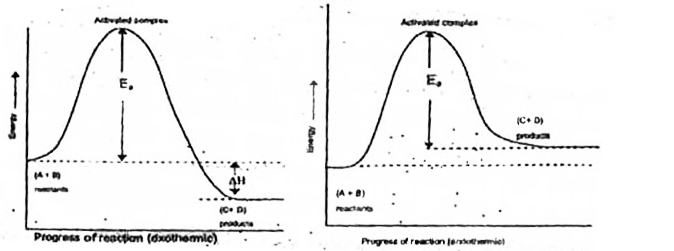The rate of reaction increases with increase in activation energy.
The correct Answer is:F
Step by step video, text & image solution for The rate of reaction increases with increase in activation energy. by Chemistry experts to help you in doubts & scoring excellent marks in Class 12 exams.
Topper's Solved these Questions
- BOOK - CENGAGE CHEMISTRYCHAPTER - CHEMICAL KINETICSEXERCISE - Archives Multiple Correct5videos
CHEMICAL KINETICS
- BOOK - CENGAGE CHEMISTRYCHAPTER - CHEMICAL KINETICSEXERCISE - Archives Single Correct19videos
CHEMICAL KINETICS
- BOOK - CENGAGE CHEMISTRYCHAPTER - CHEMICAL KINETICSEXERCISE - Exercises Fill In The Blanks37videos
CHEMICAL KINETICS
- BOOK - CENGAGE CHEMISTRYCHAPTER - CARBOXYLIC ACIDS AND THEIR DERIVATIVESEXERCISE - Exercises Archives (Analytical And Descriptive)34videos
CARBOXYLIC ACIDS AND THEIR DERIVATIVES
- BOOK - CENGAGE CHEMISTRYCHAPTER - COORDINATION COMPOUNDSEXERCISE - Archives Subjective18videos
COORDINATION COMPOUNDS
Similar Questions
Knowledge Check
- Question 1 - Select One
The rate of reaction increases with temperature due to
ADecrease in activation energyBIncrease in activation energyCIncrease in collision frequencyDIncrease in conentration - Question 2 - Select One
The rate of reaction increases with temperature due to
ADecrease in activation energyBIncrease in activation energyCIncrease in collision frequencyDIncrease in concentration - Question 3 - Select One
The rate of reaction increases with increase of temperature because a
Aactivation energy barrier is loweredBthe average energy of the products increasesCthreshold energy changesDactivation energy is lowered
The rate of an exothermic reaction increases with increasing temperature.
View SolutionRate of reaction increase with temperature :-
View SolutionThe rate of chemical reaction increases:
View SolutionThe rate of reaction increases by the increase of temperature because
View SolutionA collision between high energy molecules overcomes the forces of repulsion and brings the formation of an unstable molecule cluster, called activated complex. The life span of an activatd complex is very small. Thus, the activated complex breaks either into reactants again or new substances, i.e. products. The activation energy (Ea) depends upon the nature of chemical bonds undergoing rupture and is independent of enthalpies of reactants and products. The energy changes during exothermic and endothermic versus the progress of the reaction are as shown below :

When temperature is increased, the number of active molecule increases, i.e. the number of effective collisions will increase and the rate of reaction will increase.
Activation energy (Ea)=E(activated complex)−E(ground state)
ΔH=Ea(f)−Ea(b)
The activation energy of exothermic reaction , A→B, is 80kJ. The heat of reaction is 200kJ. The activation energy for the reaction, B→A, will beView Solution

